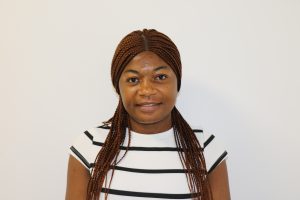
Nora Nghochuzie Nganyewo
H3Africa PI: Alfred Amambua Ngwa
Institution: University of Ghana, Legon; Medical Research Council Unit The Gambia at London School of Hygiene and Tropical Medicine
Project Affiliation: Genetic interactions between human populations and malaria parasites in different environmental settings across Africa
Abstract
Introduction: The malaria parasite Plasmodium falciparum utilizes multiple alternative receptor-ligand interactions for the invasion of human erythrocytes. Some P. falciparum clones use sialic acid (SA) residues on the surface of the human glycophorin receptors to invade the erythrocyte, while others use receptors independent of SA.
Background: I hold a BSc in Microbiology; an MSc in Molecular Parasitology and pursuing a Ph.D. in Molecular Cell Biology of Infectious diseases.
Hypothesis: intensified malaria interventions and declining prevalence in Gambia have resulted in selection of parasites with the most efficient invasion pathways and ligand expression profiles.
Motivation: Erythrocyte invasion is crucial for P. falciparum multiplication, and transmission, Hence, understanding the diversity of invasion pathways and the molecular determinants is important for illuminating host-parasite interactions and for the development of new tools.
Methodology: Blood samples were collected from 65-patients with uncomplicated malaria across 3-years (2015,2016, and-2021). Invasion phenotypes were determined using neuraminidase, trypsin, and chymotrypsin enzymes. Genetic diversity was determined by genotyping the merozoite surface protein-2 (msp2) gene and schizont-stage transcript levels for 6-P. falciparum invasion genes (clag2,eba175,eba181,Rh2b,Rh4, and-Rh5) were also obtained.
Skills: Research design, cellular and molecular research approaches, data analysis, and scientific writing.
Results: Isolates from all 3-years uses SA-independent invasion pathways with continuous increase from 2015-2021, with isolates from 2021 highly inhibited by chymotrypsin compared to 2016 and 2015 isolates. Expression of invasion ligand genes showed variation across the years – levels of clag2, were higher in 2015 and 2016 isolates than in 2021-isolates, while Rh5 levels were higher in 2021-compared to other years. Furthermore, msp2 genotyping showed an increase in mixed infections across the years from 2015-2021 but with decreased allelic heterozygosity. These suggest increasing mixed infection with an increase in the use of SA-independent invasion pathways by P. falciparum isolates in Gambia.
Achievements: One publication, a manuscript under review. I have attended conferences, workshops, and I am almost completing my laboratory work.
Acknowledgements/Mentors/Influencers: Thanks to PAMGEN for funding my Ph.D. and to my mentors Dr. Alfred Amambua-Ngwa, and Dr. Lucas Amenga-Etego for grooming me in research.
Next Steps: Completion, and defense of Ph.D. Pursue post-doctoral studies, writing grant proposals.
